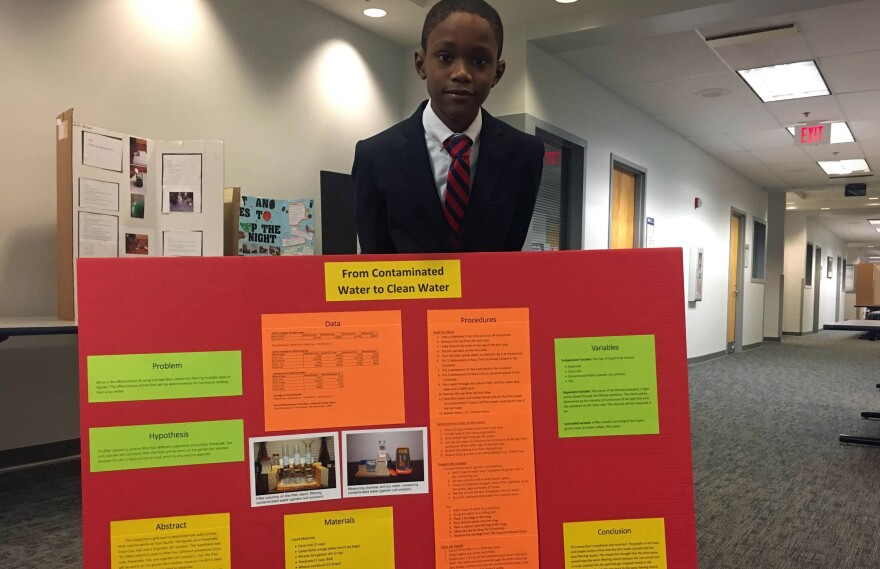For some of the Duval County’s youngest students, the last week of school before winter break wrapped up with the annual elementary school science fair.

About 250 tri-fold project-boards were displayed at the district-wide competition held at the University of North Florida where kids as young as kindergarten entered projects. On Wednesday students had the opportunity to show their classmates and parents their projects.
Second-grader Olivia Snyder was explaining her board titled “Poop is the Scoop!” to her class.
“What I did in my project was I put different types of animal feces in plants,” she said. “So I can determine what kind of animal feces is the best and nutritious for plants.”

Yes, feces. Olivia tested to see if herbivore, carnivore or omnivore feces made for the best plant fertilizer. And the result: carnivore feces worked best, disproving her hypothesis of omnivores.
Science fair hasn’t changed much other the years. The boards look the same as they did a decade ago. The left side — a problem and hypothesis. The center of the board — data, photos and the procedure. And the right side — the conclusion.
These projects had already been judged once on Monday and Tuesday. Wednesday, the students with the top scores were being interviewed for round two.
Jacksonville Beach Elementary student Jawara Lee wore a suit and striped tie during his interview, which he says was actually his Obama costume for a different school project.
“So my dad bought me a suit and I still use it for everyday purposes,” Jawara said of his outfit.
Jawara tested a variety of liquids, including soda and dirty water, using a homemade filter to see which would filter the cleanest. His bright red board plastered with a long list of neatly typed procedures and data. Jawara said winning would be nice. He didn’t expect his project to be this hard.

“I just want an award and I’ll be satisfied,” he said. But that’s up to the judges.
Judge Karl Boecklen, the science educator at the Cummer museum, said the previous day he judged close to 50 projects, which took him close to four hours.
Some of the most common projects this year were candy related, he said, like the effects different liquids have on causing gummy bears to expand, or what liquids will dissolve skittles fastest.
Another Judge, Eddie Whisler, the director of the Museum of Science and History’s planetarium, said what brand of popcorn pops the best has been common.

But both judges said what they really care about is the scientific process that goes into the projects.
“I think it’s just as important to go through the cliche experiments as any other ones," Whisler said. "Because that might be the student’s first attempt at answering the question and maybe it’s just something that they’re interested in and maybe they actually don’t know the answer or maybe they already do know the answer but retesting is also a super important aspect of it,” Whisler said.
He says it’s not all about glitzy boards or creative ideas but whether the student did the experiment properly and understood its results.

“It’s more than just ‘this is what happened, my hypothesis was wrong,’ but ‘my hypothesis was wrong because of…’ “ Boecklen said.
And Executive Director of DCPS natural and social sciences Kim Bays agrees a big reason for the science fair is exposure to the scientific process.
“But the other purpose for it is just to excite and expound upon their creativity,” Bays said. “They’re allowed to pick any topic that they want to as long as they stay within safety considerations.”
WJCT has reached out for a list of the science fair award winners.
Lindsey Kilbride can be reached at lkilbride@wjct.org, 904-358-6359 or on Twitter at @lindskilbride.





